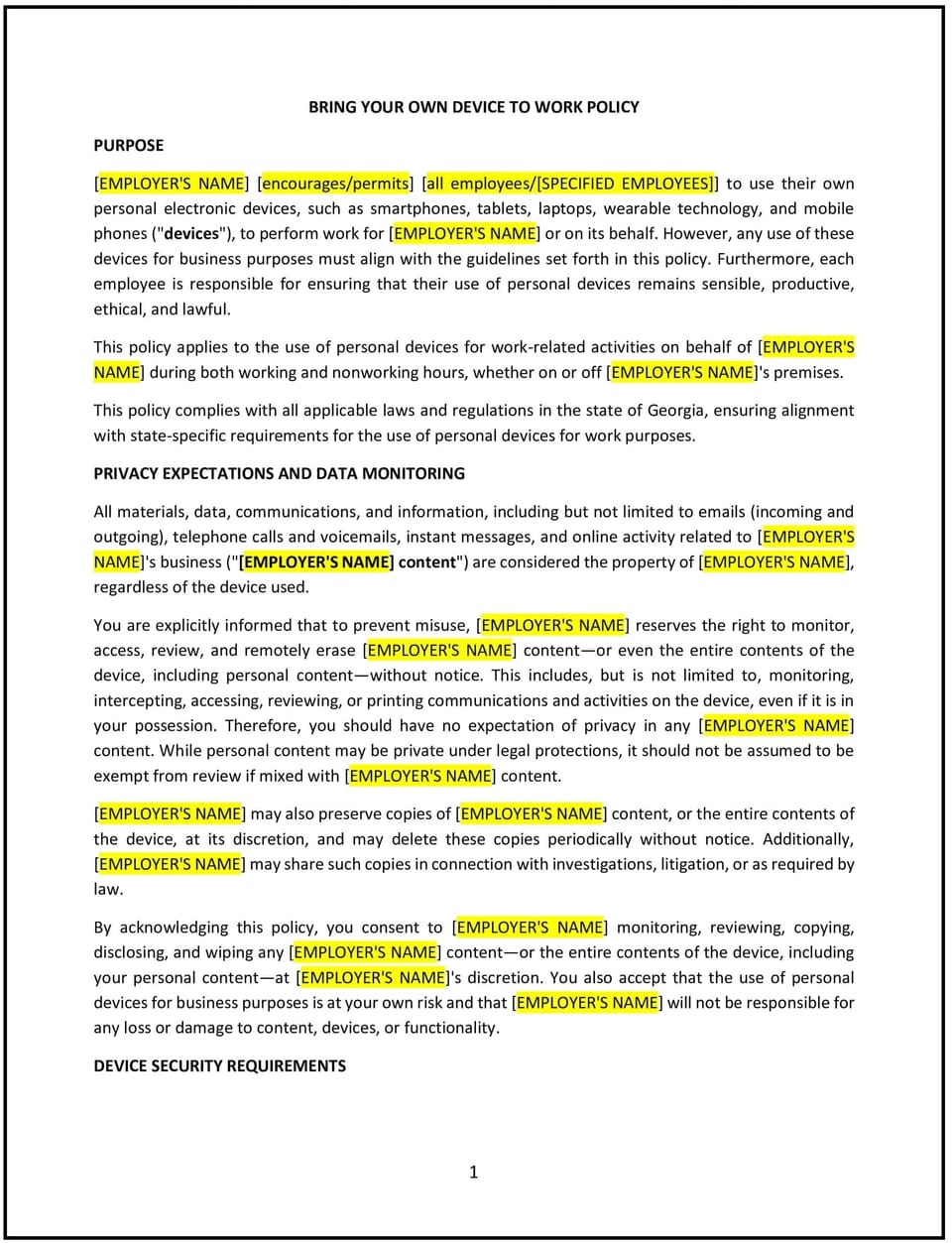Bring your own device to work policy (Georgia): Free template

Bring your own device to work policy (Georgia)
This bring your own device (BYOD) to work policy is designed to help Georgia businesses manage the use of personal devices for work purposes. The policy outlines guidelines for device usage, security, and responsibilities to maintain a secure and productive work environment.
By implementing this policy, businesses can enhance flexibility and employee satisfaction while safeguarding sensitive company data.
How to use this bring your own device to work policy (Georgia)
- Define acceptable devices: Specify which types of personal devices may be used for work purposes, such as smartphones, tablets, or laptops.
- Set security requirements: Establish mandatory security measures, such as password protection, encryption, and up-to-date antivirus software, to protect company data.
- Provide access guidelines: Define how employees will access company networks, applications, and data from their personal devices, including any authentication requirements.
- Outline usage rules: Specify appropriate usage of personal devices for work purposes, including restrictions on accessing or storing sensitive company information on unauthorized apps.
- Address reimbursement: Clarify whether the company will reimburse employees for costs related to BYOD, such as data plans or specific applications required for work.
- Establish monitoring policies: Inform employees about any monitoring of work-related activity on their personal devices, ensuring transparency and compliance with Georgia privacy laws.
- Define consequences for policy violations: Specify the actions that will be taken if an employee fails to adhere to the BYOD policy, such as loss of access or disciplinary measures.
- Regularly review and update: Periodically review the policy to ensure it remains aligned with Georgia laws, industry practices, and evolving workplace needs.
Benefits of using this bring your own device to work policy (Georgia)
Implementing this policy provides several advantages for Georgia businesses:
- Enhances flexibility: BYOD policies allow employees to use familiar devices, increasing efficiency and job satisfaction.
- Reduces costs: Businesses save on equipment expenses by leveraging employees’ personal devices.
- Improves productivity: Employees often work more efficiently with devices they are comfortable using.
- Strengthens data security: Clear guidelines for device security help protect company information from breaches.
- Reflects Georgia-specific considerations: Tailoring the policy to Georgia’s legal and cultural context ensures relevance and compliance with local standards.
Tips for using this bring your own device to work policy (Georgia)
- Communicate expectations: Clearly explain the policy to employees, including their responsibilities and the company’s security requirements.
- Provide IT support: Offer technical support for employees to ensure their personal devices meet security standards and function effectively for work purposes.
- Monitor compliance: Regularly verify that employees are adhering to the security measures and usage rules outlined in the policy.
- Address privacy concerns: Balance the company’s need to monitor work-related activities with employees’ right to privacy by being transparent about monitoring practices.
- Stay proactive with security: Regularly update the policy to address emerging security threats and technological changes that impact BYOD practices.
Q: What devices are covered under the BYOD policy?
A: The policy typically covers smartphones, tablets, and laptops. Businesses should clearly define which devices are acceptable for work use.
Q: What security measures should employees implement on their devices?
A: Employees should enable password protection, use encryption, install antivirus software, and keep their devices updated with the latest security patches.
Q: How will employees access company systems from personal devices?
A: Employees should use secure methods, such as VPNs or multi-factor authentication, to access company networks and data.
Q: Will the company reimburse employees for work-related expenses?
A: Businesses should clarify whether they will reimburse employees for costs such as data plans or required applications. If reimbursement is not provided, employees should be informed during policy implementation.
Q: What happens if an employee’s device is lost or stolen?
A: Employees should immediately report the loss or theft of their device. Businesses should have protocols in place to remotely wipe company data from the device to prevent unauthorized access.
Q: How is employee privacy protected under this policy?
A: Businesses should only monitor work-related activities on personal devices and clearly communicate the extent of monitoring to employees.
Q: What are the consequences for violating the BYOD policy?
A: Employees who fail to follow the policy may face consequences such as loss of access to company systems or disciplinary action, depending on the severity of the violation.
Q: How often should this policy be reviewed?
A: The policy should be reviewed annually or whenever there are significant changes in Georgia laws, workplace needs, or technological advancements.
This article contains general legal information and does not contain legal advice. Cobrief is not a law firm or a substitute for an attorney or law firm. The law is complex and changes often. For legal advice, please ask a lawyer.


